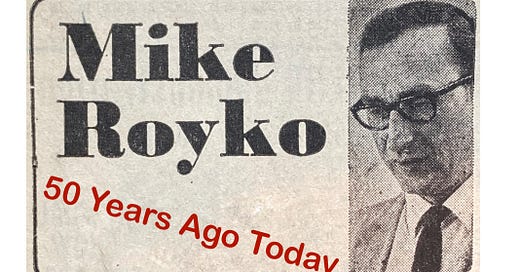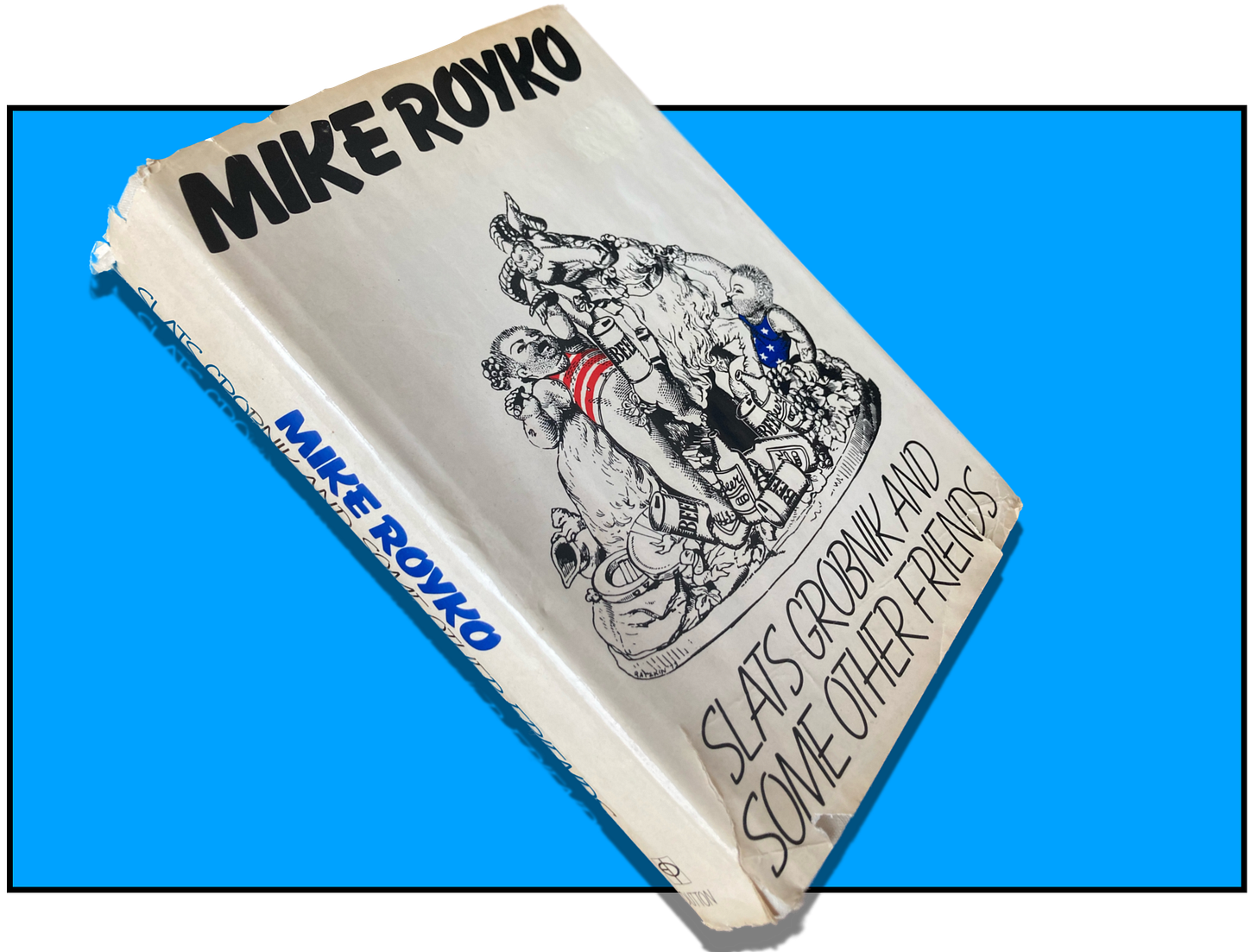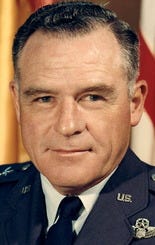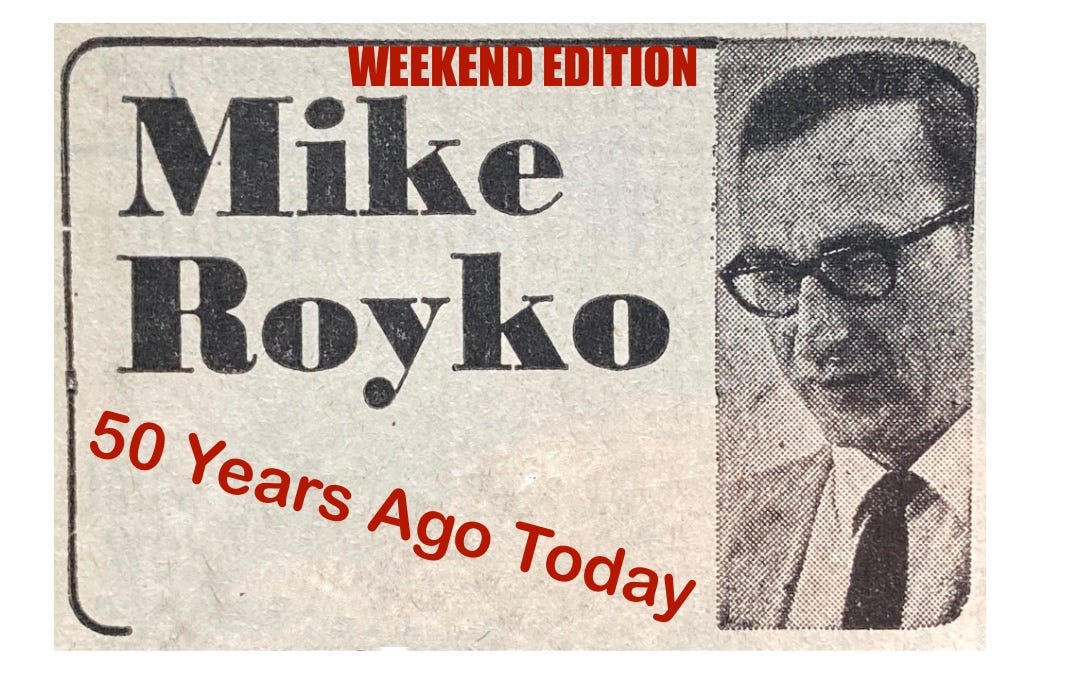To access all site contents, click on the rose icon in the upper left corner or HERE.
Why do we run this separate item, Mike Royko 50 Years Ago Today? Because Steve Bertolucci, the hero of the serialized novel central to this Substack, “Roseland, Chicago: 1972,” lived in a Daily News household. The Bertoluccis subscribed to the Daily News, and back then everybody read the paper, even kids. And if you read the Daily News, you read Mike Royko. Get your Royko fix on Twitter too— @RoselandChi1972.
June 26, 1972
“Like any public official, Mayor Daley has been accused from time to time of not spending the taxpayers’ money as wisely as he might,” Mike begins cryptically today.
A classic Mike maneuver, in which readers must ponder what current scandal, or possibly new unknown scandal, Mike will lead us to. He is actually going to touch on the most red-hot current political issue in Chicago. A real atomic bomb of a Chicago political issue.
“But the mayor seems to be considering a dramatic economy move in the future,” writes Mike.
“He would save us money this way:
“All over the city are signs that bear his name, such as ‘Welcome to Chicago, Richard J. Daley, Mayor.’

“Some day, maybe in 1975 and surely in this century, Daley will step aside.
“When that happens, all those signs will be obsolete and would have to be replaced.
“That will be a sad day for the wunnerful people of this wunnerful city, and the thought of it probably bothers the mayor as much as anyone.
“But he apparently has found a way to avoid wasting all those fine signs.
“Instead of replacing them, they could be salvaged by merely changing one letter—the middle initial.
“Then they would read: ‘Welcome to Chicago, Richard M. Daley, mayor.’”
Older Readers may pause and remember— “Oh right, there did used to be a time when it was not inevitable that the real Mayor Daley’s son would be mayor even longer than his father.”
For Youngish Readers, Mayor Daley’s son, Richard M. Daley, probably feels like the real Mayor Daley—and they perhaps didn’t know much about the guy with the same name who came earlier, until they read up on the ‘60s for a college class.
Or—just going by how my brain worked as a kid—I could see some Younger Readers hearing about “Mayor Daley” in various time periods and assuming it was all the same guy. Kind of a political Highlander, but Irish. Who pays attention to middle initials?
Note: Richard M.’s longer time in office is only by one year. Father and son were both elected to six terms, but neither served 24 years. The real Mayor Daley died just a year into his sixth term, making it to 21 years in office. Richard M. got to just 22, because he had a shortened first term in office. Richard M. was initially elected in 1989 after beating Ald. Eugene Sawyer in a special election to finish the term of deceased Mayor Harold Washington. (Ald. Sawyer was briefly Mayor Sawyer after being appointed by the City Council to fill Washington’s seat until the special election.)
Now, from our 21st century POV, we know that the city really could have used Mike’s penny-pinching idea, if they had just hung on to all the “Richard J. Daley” signs a little bit longer. But that’s how hoarders get started. Back to Mike.
“Of course, to do this, we would need a mayor named Richard M. Daley,” writes Mike. “But the mayor has provided for us. He happens to have a son with that name.”
“You may have read about him or seen him on TV. He is the mayor’s eldest son and recently he has led some of those raiding parties that stormed into meetings of dissident Democrats challenging the mayor’s crowd for seats at the Democratic convention.
“He has shown as much skill at shouting, pointing his finger, waving his arms, jeering, hooting and hollering as any of the older politicians leading the other raiding parties. Indeed, there were moments when—if he had a bit more jowl—he could have passed for his arm-waving father.”
What raids?, you may thinking.
Some necessary background: A group of independent Democrats, led by Ald. Bill Singer and Rev. Jesse Jackson, are challenging Mayor Daley’s slate of delegates elected in the recent primary to represent Cook County at the upcoming 1972 Democratic National Convention. The challengers would like to kick out Mayor Daley’s elected delegates, and put in their own people.
The challengers claim the election of Daley’s delegate slate broke the new reform rules set by the Democratic Party. In particular, the reform rules are supposed to preclude political organizations like the Machine from choosing and financially backing delegate candidates. (Mayor Daley’s Machine, of course, did exactly that.)
The rules also require the ultimately elected delegates to include a percentage of women, Blacks, young people and other minorities who are representative of the local population. (Mayor Daley’s delegates were predominantly old-school white male politicos, and he just gave an inch recently by kicking some out and substituting a few women.)
This week in our 1972 timeline, Chicago Today wrote an editorial suggesting that Mayor Daley’s supporters seem to think he has so much power in the delegate fight, maybe he should climb on top of the Empire State Building and swat down some airplanes. I could not resist envisioning that scenario. Or using it again here.
The raids Mike mentioned happened last week in our 1972 timeline, as part of this delegate tussle. Here’s what happened:
The Singer-Jackson challengers held their own caucuses in each of Cook County’s eight congressional districts to choose an alternative slate of delegates. Machine loyalists raided those caucus meetings—quite dramatically.
That’s the Daily News headline. The lede, by Charles Nicodemus and Larry S. Finley:
“Hundreds of Mayor Richard J. Daley’s Regular Democratic ward organization backers, shouting curses and obscenities, stormed caucuses called by rival independent Democrats to elect an ‘alternative delegation’ to the Democratic National Convention.”
“They beat two men, forcibly detained another for 10 minutes, pulled the hair of women challengers and overturned chairs and tables.” This is not the most violent example of their handiwork, but it stuck with me: At one meeting, they pulled the chairs out from under the meeting organizers as they tried to conduct the caucus.
On June 23, TCD recounted how Ald. Vito Marzullo and friends stormed one meeting with a bullhorn, and when the chairman threatened to adjourn and meet somewhere else, Ald. Marzullo yelled, “We’ll follow you to the grave!”
Young Richard M. Daley was in the thick of it.
Future Illinois state senator, future Cook County State’s Attorney, and future Chicago Mayor Richard M. Daley led the storming of the meeting for the 5th Congressional District, held in St. James Roman Catholic Church, 2920 S. Wabash.


In the papers, only Chicago Today had a detailed account of what happened at St. James. Thank the Newspaper Gods it was written by Jeff Lyon.
“Led by Richard M. Daley, the mayor’s son, the Daley forces packed the 5th Congressional District meeting place in St. James Catholic Church…using bullhorns to shout down speakers until the meeting adjourned,” wrote Lyon.
“‘To me, it was mob rule,’ said [Andrew] Leahy, chairman of the meeting. ‘What first amazed me, when I got to the church, was that no one else had arrived. Richard Daley was there. I know him, at least to say hello. He said nothing but had a strange look in his eye.’
“Leahy said that as the meeting was about to begin, the church was inundated with 300 to 400 Daley loyalists,” outnumbering the Singer-Jackson challengers.
“‘They had been bused in, at least some of them,’ [Leahy] said. ‘Anyway, I started trying to get the electors arranged when suddenly young Daley jumps up and starts yelling, “When is this meeting going to begin? Point of order. Are you [Leahy] a resident of the 5th district?” He knew I wasn’t. But by design, we had chairmen live out of the districts so they would not influence the electors.’
“Leahy continued:
“‘Booing started. Then, as I tried to say something, about the meeting coming to order, Daley comes up on stage asking me by what authority I was conducting this meeting. Ald. [Michael] Bilandic [11th] joined him. I told them that under the circumstances we could conduct no meeting and since I feared for the safety of the electors—one was 18, two were women—I got them out of there and adjourned to the rectory where we elected seven delegates and two alternates. Also on hand were Ald. [Edward] Burke [14th] and Matt Danaher, clerk of the Circuit Court. The whole thing appalled me.’”

This is why Mike focuses today on young Richard M. Daley.
“Being entrusted with one of the raiding parties is evidence of his standing in the Machine,” writes Mike. “But that is only part of it.”
Mike lists how Mayor Daley has been bringing his boy along: Young Richard M. isn’t even 30, yet he’s already acting committeeman of Daley’s home 11th ward. (Mayor Daley is, of course, the elected committeeman of his own ward, so he can just let his boy run it.) Young Daley is a lawyer. He served as a delegate to the recent Illinois Constitutional Convention. And he’s running for the Illinois State Senate right now in our 1972 timeline—or, as Mike puts it, “He will be elected to the state Senate this year.”
“As one of the Machine’s elders said: ‘You can assume he’s not being trained for a career as an alderman,’” Mike writes.
“‘A few years ago, when young Richard M. first began showing up with his father frequently, he had a shy, almost humble way about him.
“A City Hall lawyer who knew him then says:
“‘Now he has an aura of power about him. When he walks into City Hall, people rush up to shake his hand.
“‘And he has become more remote. He’s suspicious of everyone except people in his own circle, which is the mayor’s circle. He’s got a way of looking at everybody as if they are after him for a favor.”
Admittedly, Richard M. was probably right about that. Anyway, Mike notes that “If the mayor is grooming his son,” that’s normal nepotism in Chicago.
“After all these years in office, the mayor probably thinks that he has rights of title,” Mike concludes. “And what nicer an inheritance to pass on to your boys than the City of Chicago.”
NOTE: To see what happened on this atomic Chicago political issue this week in our 1972 timeline—in other words, what has happened since young Richard M. Daley and hundreds of other Machine loyalists raided the Singer-Jackson caucuses—see THIS CRAZY DAY IN 1972 under June 27, 28 and 30, and July 1 and 2.
June 27, 1972
Go read this one in full in “Slats Grobnik and Some Other Friends.” It’s in the “Some Other Friends” section, and easy to find because the columns are arranged by date.
This is a delicious read, with Mike’s spare prose that doesn’t spare himself as much mocking as anyone else. Because this is one those columns where Mike writes about an unnamed man in the third person, which turns out to be him. As mentioned elsewhere, sometimes he makes that clear in these columns, sometimes he doesn’t.
A very brief taste, since you can slurp the whole thing down from the book:
“The stoop-shouldered man and his wife came out of the restaurant and walked to their car in the parking lot. He unlocked her door, went around to get in on his side, stopped, and stared at his car.
“In the door was a dent. It wasn’t a big dent, but it was enough so he saw it immediately.
“‘Goddamn it,’ he hissed.
“His car was new. It was in the $4,500-to-$5,000 bracket. The paint glowed with Blue Coral wax.”
That’s $30,375-$33,750 in 2022 money, which doesn’t sound like much for a car by 21st century standards, but these days many more people are willing to spend as much money on cars as a small condominium. To back up that perception, I see that ConsumerGuide.com has a great couple of articles on car prices in 1972.
“The average 1972 new car listed for around $3500, roughly $1500 more than the cars on our cheapest list,” per their article on the most expensive cars of 1972. So Mike spent $1,000 more than average for his new ride, which is an extra $6,750 in 2022 money. I’m thinking some of that best-selling “Boss” money went into this car.
Also, this the car must have replaced Mike’s Ford, which he wrote about on February 10, much to the dismay of the Ford company. Regarding that unnamed model, Mike wrote a column answering a Ford ad campaign asking for ideas on how they could “do a better job.”
“I am always eager to help, so I wrote a column saying that my car had started falling apart right after I bought it,” wrote Mike. “I suggested they could do a better job if they didn’t sell cars that quickly fell apart.”
So Mike finally got rid of that Ford, he got a gorgeous somewhat expensive car lovingly protected with Blue Coral wax, and very quickly he gets a dent while out to dinner with his wife.

Mike sees immediately that the idiot in the next parking space must have flung open his own car door to make that dent.
“He stood with his hands on his hips, a Bogart-like grimace on his face, staring at the dent. In his eyes, it got bigger and deeper. He could almost see the rust spreading….The car meant something to him, silly as that can be. It was the only new car he had ever liked, and one of the few he had ever owned.”
Go get your copy of “Slats Grobnik” to remind yourself of how Mike solves this dilemma—or go buy it. I won’t tell you what he does, but the last line is:
“It’s a true story. Don’t ask me how I know.”
June 28, 1972
And by Wednesday, we’re right back at that red-hot, atomic Chicago political issue de jour: Chicago’s delegates to the upcoming 1972 Democratic National Convention.
In May, the convention sent a hearing officer to listen to both sides—Mayor Daley’s people, and the Singer-Jackson challengers. The hearings were…very Chicago! The hearing officer just submitted his report to the convention’s Credentials Committee, which will use it to decide whether to seat Mayor Daley’s delegates, or the Singer-Jackson delegates.
The hearing officer backed the Singer-Jackson challengers. See June 27 in this week’s TCD1972 for more.
“The Democratic Party’s reformers really have Mayor Daley in a corner now,” Mike starts. “They are closing in for the kill. And when they get done with him, they won’t know what in the hell hit them.”
…. “But Daley doesn’t have to budge an inch. He doesn’t have to compromise on anything. They have chased him so hotly that now he has them.
“You see, Daley knows something that many of the party reformers seem to have forgotten: All they will do in Miami Beach next month is choose a candidate.
“They can throw Daley’s Machine delegates out, and the candidate will be McGovern. Or they can seat Daley’s people and the candidate will probably still be McGovern.
“If they throw him out, Jesse Jackson will be happy, Bill Singer, and Shirley MacLaine, and Abbie Hoffman, and all the clear-eyed college kids, and the people who still are nursing their hurt feelings from 1968 in Chicago.”
…. “But what will they have won?”
“The real victory will come, if it comes at all, next November. That is when we elect a President…..For a Democrat to carry Illinois, he has to carry Chicago and Cook County. Not by a narrow margin, but very big.
“Now, when you talk about piling up Democratic votes in Chicago and Cook County, whose name comes to mind? Shirley MacLaine? Jesse Jackson? George McGovern?
“Ho Ho. That’s rich.”
More analysis, and then the zinging conclusion:
“If they mess around with the kid from Bridgeport too much, McGovern better start writing something besides the acceptance speech for his nomination. He might as well start writing that telegram of concession to President Nixon right now.”
June 29, 1972
“Richard Martwick, the Cook County superintendent of schools, has warned his staff that anyone having anything to do with me will be fired.”
Oh, what a great column Mike wrote on May 30 about Richard Martwick.
“There is nothing the Daley Machine likes better than a real family man,” Mike wrote then. “So the Machine should be very pleased with Richard Martwick, who was elected in 1970 as the Cook County superintendent of schools.
“Mr. Martwick has shown that he is a real family man by loading his payroll with members of his family.”
Mike goes over the long list, again, of all the relatives and other hangers-on that Martwick has hired, plus a few new ones.
“Martwick was angered by these disclosures, and by the possibility that some of the professional educators in his office might have told me about them,” Mike writes today. “I can understand his being upset. People might feel that any office involved in education ought to hire the best qualified people, rather than a horde of friends and relatives.”
Mike calls Martwick to talk about it, but gets PR person Morton H. Kaplan.
“Mr. Kaplan the publicity man would not speak because he did not like the kind of publicity I provide.”
Kaplan told Mike he’ll have to submit future questions in writing, and Martwick will consider answering, via Kaplan.
“This, I assume, was Mr. Martwick’s way of setting a good example for his staff,” Mike writes. “It would not be fair for him to have direct contact with me, while ordering his people to abstain.”
Mike decides to simplify the whole process by posing his questions for Martwick right there in the column, such as:
“Question: Is it true, as one of your employees tells me, that several of the long-time professional people in your office held a meeting at the Lake Shore Club to discuss what they consider to be your sheer incompetence in running the office? And is it true that when you found out about the meeting, you blew your stack?”
Mike’s conclusion:
“Question: After you read this, what are you going to threaten your employees with next—exile?”
If you dig Mike Royko, you’ll want to see the news he’s writing about. Check it out here!
June 30, 1972
“A notice was recently posted on the bulletin boards at the Great Lakes Naval Hospital, describing trouble a few sailors got into, and their punishment,” writes Mike.
“Most of it was the kind of stuff young servicemen have been doing since the days of the sword and shield….But one item was rather unusual.”
Mike now quotes the stilted, silly, formal and confusing language of three separate military charges against Michael S. Ferner, which goes on for several legalistic paragraphs.
“That’s right,” Mike sums it up. “It all adds up to a court-martial for painting a peace sign on a $2.50 sheet and hanging it on a fence.”
Mike speaks with Ferner, who painted a peace sign on a bed sheet and hung it on the base fence right next to his apartment there, just as an anti-war demonstration was about to take place outside the base.
The peace sign drew a jeep full of Department of Defense security guards who went nuts and locked Ferner up until that evening, after the demonstration. They tried to get Ferner to accept a nonjudicial punishment, but he wouldn’t. So now he’ll be court-martialed.
Mike calls up the Great Lakes base director of security, who denies it happened, and insists Mike has a ‘bum scoop’ because nobody was arrested.
“I had trouble believing somebody gave me a ‘bum scoop,’ since I had a copy of the charges and specifications on my desk,” Mike writes. “But maybe Lt. Comr. Lindstrom doesn’t look at his own bulletin board.
“One thing this case shows is that our armed services aren’t getting soft.
“Maybe they will let a four-star general get away with ordering bombings in total disregard of the President’s orders.
“But they can be tough as hell on a guy who rips off a $2.50 sheet.”
Mike is referring to Air Force Lt. General John D. Lavelle, whose story is more complicated than news reports at the time indicated—a good example to us that as much as we here love the papers, we can’t believe everything we read there, in 1972 or any other year. Even when an account is correct, it may not be complete. Mike’s zinger here, however, makes sense according to what was known at the time.
General Lavelle was relieved of his command and forced to retire after it came out that he ordered bombing raids in North Vietnam in early 1972 while the Nixon administration was insisting no such bombing was going on. Lavelle had to retire as a two-star rather than four-star general, because retiring at three or four stars requires Senate approval, and the Senate refused.
President Nixon ordered a resumption of bombing in North Vietnam in April, but Lavelle’s bombings were earlier.
Still, Lavelle wasn’t court-martialed.
General Lavelle’s disputed bombing raids were reported at the time as “protective reaction” strikes. In June 1972, U.S. Senator William Proxmire called for court-martial proceedings against Lavelle, saying that if a soldier disobeyed orders, “he would be investigated, charged, court-martialed, given a bad conduct discharge, and confined for two years at hard labor. But the insubordination of Gen. Lavelle was glossed over while the general was quietly retired on a $2,500-a-month pension and the military tried to cover up the event.” (That’s $16,875/month in 2022 money, or $202,500/year.)
On June 15, 1972, the Defense Department announced they wouldn’t court-martial Lavelle, or anyone else, for the unauthorized bombing, to broad disapproval.
But new information came to light much later.
In “A Beer with the General” for The New Yorker in 2010, Amy Davidson Sorkin sums it up:
This week, President Obama asked the Senate to restore the rank of General John Lavelle, who had been demoted and forced to resign in 1972 for supposedly ordering the unauthorized bombing of targets in North Vietnam—bombings that violated the rules of engagement at the time. (A sergeant had written to his senator about being told to falsify reports about the raids, setting an investigation in motion.) But documents located by Aloysius and Patrick Casey, who published an article on their findings in 2007 in Air Force magazine, show that Lavelle did have authorization—from President Richard Nixon.
[Seymour] Hersh was on this story thirty-five years ago; as Jeff Schogol, a reporter for Stars and Stripes, noted in a story this week, back in 1972, “Seymour Hersh, then a reporter for the New York Times, reported that Lavelle had been given implicit permission to carry out the raids.” One of Hersh’s sources for that assertion was Lavelle himself, as Hersh detailed in this passage in an engrossing, six-hundred-word footnote in “The Price of Power,” his book on Kissinger
Note: And apparently Gen. Lavelle did not instruct anybody to report those bombing raids incorrectly, though someone below him clearly did issue that order.
WBUR, Boston’s NPR station, took a long look at Lavelle’s case in 2012, and the introduction included:
“Why Lavelle's career was cut short without warning is shrouded in executive and military secrecy that marked the end of a losing war. Seven years after Lavelle was fired, he would die of a heart attack — but not before a public shaming that left him a broken man. Forty years later, his family would still be looking for answers.”
President Obama asked for Lavelle’s four-star rank to be restored in 2010, which per Wikipedia was “recommended by the Air Force Board for Correction of Military Records, the Secretary of Defense and the Secretary of the Air Force. However, the Senate Armed Services Committee declined to vote on the nomination, allowing it to expire without action at the end of the legislative session.”
As we here all know, weekends could be sad for a Daily News family because Mike Royko wasn’t in the Daily News’ single weekend edition. So we look for Mike elsewhere on weekends.
July 1-2, 1972
Looking for Mike in other newspapers, Installment #3
This week we continue slowly wending our way through Mike’s appearances in other Chicago newspapers. See Installment #1 here, and Installment #2 here. Today, from the Chicago Tribune on May 14, 1967, an ad for Mike’s first book collection of columns, “Up Against It.”
By the way, this feature is no substitute for reading Mike’s full columns. He’s best appreciated in the clear, concise, unbroken original version. Mike already trimmed the verbal fat, so he doesn’t need to be summarized Reader’s Digest-style, either. Our purpose here is to give you some good quotes from the original columns, plus the historic and pop culture context that Mike’s original readers brought to his work. You can’t get the inside jokes if you don’t know the references. Plus, many iconic columns didn’t make it into the collections, so unless you dive into microfilm, there’s riveting work covered here you will never read elsewhere.
If you don’t own any of Mike’s books, maybe start with “One More Time,” a selection covering Mike’s entire career which includes a foreword by Studs Terkel and commentaries by Lois Wille.
Do you dig spending some time in 1972? If you came to MIKE ROYKO 50 YEARS AGO TODAY from social media, you may not know it’s part of the book being serialized here, one chapter per month: “Roseland, Chicago: 1972.” It’s the story of Steve Bertolucci, 10-year-old Roselander in 1972, and what becomes of him. Check it out here.
To get MIKE ROYKO 50 YEARS AGO TODAY in your mailbox weekly along with THIS CRAZY DAY IN 1972 and new chapters of the book—
SUBSCRIBE FOR FREE!



























